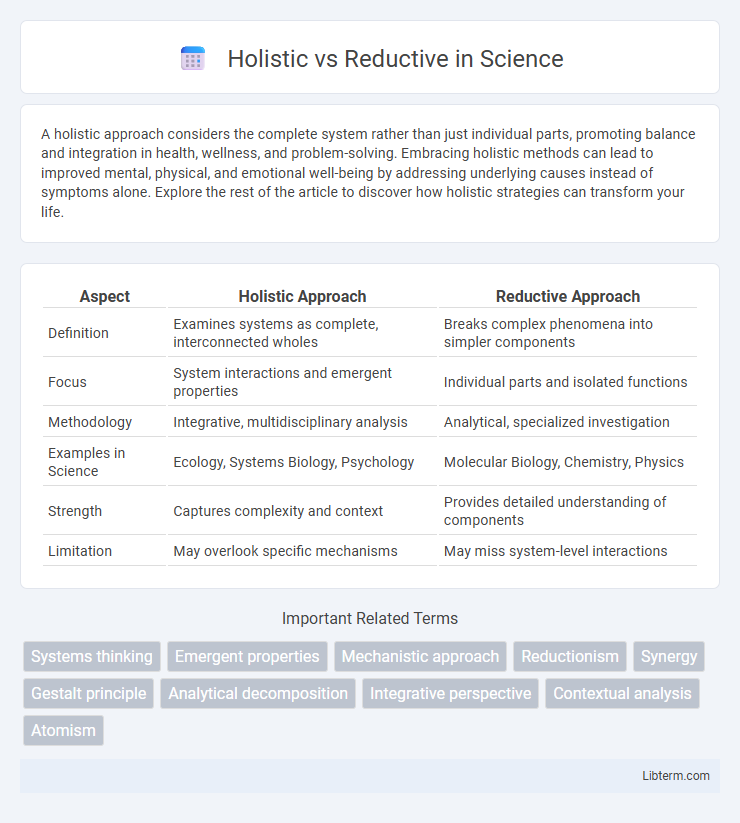A holistic approach considers the complete system rather than just individual parts, promoting balance and integration in health, wellness, and problem-solving. Embracing holistic methods can lead to improved mental, physical, and emotional well-being by addressing underlying causes instead of symptoms alone. Explore the rest of the article to discover how holistic strategies can transform your life.
Table of Comparison
| Aspect | Holistic Approach | Reductive Approach |
|---|---|---|
| Definition | Examines systems as complete, interconnected wholes | Breaks complex phenomena into simpler components |
| Focus | System interactions and emergent properties | Individual parts and isolated functions |
| Methodology | Integrative, multidisciplinary analysis | Analytical, specialized investigation |
| Examples in Science | Ecology, Systems Biology, Psychology | Molecular Biology, Chemistry, Physics |
| Strength | Captures complexity and context | Provides detailed understanding of components |
| Limitation | May overlook specific mechanisms | May miss system-level interactions |
Introduction to Holistic and Reductive Approaches
Holistic approaches examine systems as integrated wholes, emphasizing the interdependence of all components and their interactions within a broader context. Reductive methods break down complex phenomena into simpler parts to analyze and understand individual elements separately. Understanding these contrasting perspectives is essential for selecting the appropriate framework in disciplines such as science, medicine, and philosophy.
Defining Holistic Thinking
Holistic thinking involves understanding systems by recognizing the interconnectedness and interdependence of their parts, emphasizing patterns and context rather than isolated elements. It prioritizes complexity and the relationships between components, allowing for comprehensive problem-solving and a broader perspective. This approach contrasts with reductive thinking, which breaks down systems into distinct parts for analysis, potentially missing the emergent properties that arise from whole-system interactions.
Understanding Reductive Analysis
Reductive analysis breaks down complex systems into their simplest components to understand individual parts and their functions, emphasizing clarity through segmentation. This approach facilitates detailed examination of each element, making it easier to predict outcomes based on isolated variables. However, reductive analysis may overlook emergent properties and interactions that arise only when components function together within the whole system.
Historical Context of Both Perspectives
The historical context of holistic and reductive perspectives reflects their roots in early philosophical and scientific thought, where holism emerged from ancient Eastern traditions emphasizing interconnectedness, while reductionism developed through Enlightenment-era Western scientific methods focusing on isolating individual components. In the 19th and 20th centuries, holistic approaches gained prominence through Gestalt psychology and systems theory, contrasting with the rise of molecular biology and analytical chemistry that exemplified reductive methodologies. These histories illustrate a continuous interplay between viewing phenomena as integrated wholes versus as assemblies of parts, shaping disciplines like medicine, ecology, and philosophy.
Key Differences Between Holistic and Reductive Methods
Holistic methods analyze systems by examining the interactions and relationships between components to understand the whole, while reductive methods break down systems into individual parts for detailed study. Holistic approaches emphasize context, complexity, and emergent properties, whereas reductive approaches prioritize isolating variables and simplifying phenomena to identify causal mechanisms. The key difference lies in holistic methods fostering integrative insights, whereas reductive methods support precise, component-level explanations.
Advantages of Holistic Approaches
Holistic approaches promote comprehensive understanding by integrating multiple perspectives and emphasizing the interconnectedness of systems, which enhances problem-solving and innovation. They often lead to sustainable solutions by addressing root causes rather than symptoms, benefiting long-term outcomes in fields such as healthcare, environmental management, and organizational development. This approach improves adaptability and resilience by considering the dynamic interactions within complex environments, fostering more effective decision-making and strategic planning.
Benefits of Reductive Methods
Reductive methods offer precise analysis by isolating individual components, enabling detailed understanding of complex systems. This approach facilitates reproducibility and clarity in scientific experiments, making it easier to identify cause-and-effect relationships. The efficiency of reductive techniques supports targeted problem-solving and innovation across disciplines such as chemistry, biology, and engineering.
Applications in Science and Medicine
Holistic approaches in science and medicine emphasize the integration of biological, psychological, and social factors to understand health and disease comprehensively, often applied in chronic disease management and personalized medicine. Reductive methods focus on isolating specific components, such as molecular pathways or individual genes, which are crucial in drug development, genetic research, and targeted therapies. Combining holistic and reductive strategies enhances diagnostic accuracy and treatment efficacy by addressing complex interactions within biological systems and individual variability.
Choosing the Right Approach: Factors to Consider
Choosing between holistic and reductive approaches depends on factors such as the complexity of the problem, the need for comprehensive understanding, and available resources. Holistic methods are ideal for systems involving interdependent components, promoting integrated solutions and long-term sustainability. Reductive approaches suit situations requiring detailed analysis of specific parts, emphasizing precision and efficiency in problem-solving.
Conclusion: Integrating Holistic and Reductive Perspectives
Integrating holistic and reductive perspectives enhances comprehensive understanding by combining the broad, systemic insights of holism with the precise, detailed analysis of reductionism. This synthesis allows for more effective problem-solving across disciplines by addressing complexity at multiple levels. Embracing both approaches fosters innovation, accuracy, and depth in research and application.
Holistic Infographic

 libterm.com
libterm.com